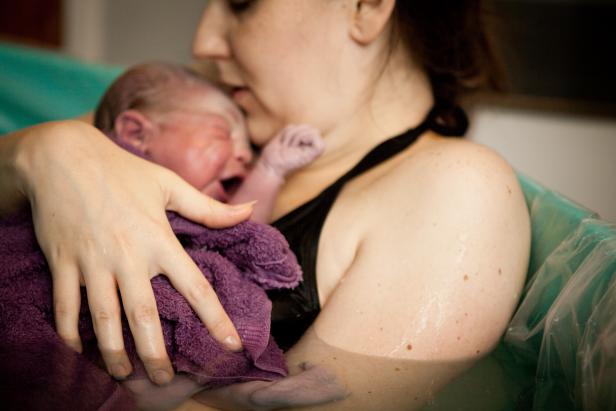More Moms May Soon Be Able to Choose Water Births in Hospitals
These researchers want to normalize water births.


ideabug
When a mom-to-be is creating a birth plan for herself, she has a lot of options, including where she will deliver, the types of interventions she plans to use and how she wants to spend those first few hours with her newborn.
While water births–a practice when a mother labors and/or delivers in a large tub full of warm water– are widely offered in birthing centers, they are often not an option for those who plan to deliver in a hospital. However, a new study aims to change this, and researchers hope their findings will make water births more common in hospitals across the country.
According to a new study from researchers at the University of Michigan, water births are just as safe as traditional births for both mothers and babies. In fact, there may be some benefits for mothers who choose water births.
For the study, researchers examined 397 water births and 2025 “land births” or traditional births. What they found was that there were no differences in outcomes between water birth and traditional births for Apgar scores, which are results from the test given to newborns that checks their heart rate, muscle tone and other vitals in order to determine whether emergency care is needed. Researchers found that there was no difference between neonatal intensive care admissions for babies born from water births and traditional births.
However, women who opted for water births were less likely to sustain a first or second degree lacerations. Meanwhile, researcher showed that postpartum hemorrhage rates were similar for both groups of mothers.
"And what we found is there's no difference in any of those outcomes except that women who gave birth in the water had a lower rate of tears that would require some kind of repair," said Joanne Motiño Bailey, director of nurse-midwives at Michigan Medicine.
Many doctors are still mixed on their recommendations for water births. While some say it’s safe to labor in the tub, they would prefer the actual delivery happen outside of the tub. It’s reported that only about 10 perfect of hospitals in the country offer water births. In 2014 the American College of Obstetricians and Gynecologists and the American Academy of Pediatrics issued a joint warning, advising against women remaining in the bathtub after their first stage of labor.
However, Bailey is hopeful that this study will help encourage more hospitals to offer water births and for more women to ask for water births if it is part of their birth plan.
"My deep hope is that this becomes something routinely available as an option for women who are eligible for a water birth," she said.















